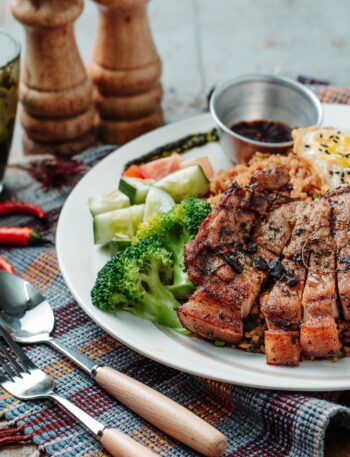Introduction
The keto diet has gained popularity in recent years due to its ability to aid weight loss, improve blood sugar control, and promote overall health. Following the basic rules of the keto diet is essential to achieving the desired results. In this article, we will discuss the 10 basic rules of keto diet, including what foods to eat and avoid, supplements, and common mistakes to avoid.

What is the Keto Diet?
The keto diet is a low-carbohydrate, high-fat diet that promotes weight loss by inducing ketosis, a metabolic state in which the body uses stored fat as its primary fuel source. The keto diet restricts carbohydrate intake to between 20 to 50 grams per day. Which is much lower than the recommended daily intake of 225 to 325 grams per day. This low-carbohydrate diet causes the body to produce ketones from the breakdown of fat. Which the body uses as an alternative energy source.Basic rules of keto
Also Read: the-science-behind-the-keto-diet
Benefits of the Keto Diet
Researchers have shown that the keto diet provides numerous health benefits, including weight loss, improved blood sugar control, and a reduction in inflammation. Furthermore, medical professionals have used it to treat certain medical conditions, such as epilepsy and type 2 diabetes. The keto diet may also improve heart health by reducing triglyceride levels and increasing HDL (good) cholesterol levels.
Also Read: keto-diet-for-bodybuilders
Keto rules for beginners
To achieve the desired results on the keto diet, it is essential to follow some basic rules of keto diet, This basic rules of Keto includes
Also Read: lazy-keto-food-list
Limit Carbohydrate Intake
Limiting carbohydrate intake is a key component of a keto diet. The goal of a keto diet is to put your body in a state of ketosis, where it begins to burn fat for fuel instead of carbohydrates. This is achieved by drastically reducing your carbohydrate intake and increasing your fat intake.
The recommended amount of carbohydrates for a keto diet is typically between 20-50 grams per day, depending on the individual’s specific needs and goals. This means avoiding high-carbohydrate foods like bread, pasta, rice, and sugar, and instead focusing on foods that are high in healthy fats like avocado, nuts, seeds, and oils.
Also Read – Free 30 day keto diet plan generator
It’s important to note that the keto diet is not appropriate for everyone and should be done under the guidance of a healthcare professional. Additionally, it’s essential to ensure you’re still getting adequate nutrients, including fiber and vitamins, while following a keto diet.
Also Read: lazy-keto-meals
Increase Fat Intake | keto fats to eat
Also Read: keto-salad-recipes
Increasing fat intake is an essential part of the keto diet. The goal of the keto diet is to put your body in a state of ketosis, where it begins to burn fat for fuel instead of carbohydrates. This is achieved by drastically reducing your carbohydrate intake and increasing your fat intake.
Healthy sources of fats that are recommended for a keto diet include avocado, nuts, seeds, olive oil, coconut oil, grass-fed butter, and fatty fish like salmon. These foods provide essential fatty acids, which are necessary for many bodily functions, including hormone production, brain function, and cell growth.
It’s important to note that while fat intake should be increased on a keto diet, it’s still essential to maintain a balanced and healthy diet. This means including plenty of vegetables, high-quality proteins, and adequate fiber to support overall health and wellbeing.
Also Read: keto-snacks-recipes
Moderate Protein Intake
Moderate protein intake is also an important part of the keto diet. While increasing fat intake is essential to achieving ketosis, it’s important not to overdo it on protein, as too much protein can also interfere with ketosis.
The recommended amount of protein for a keto diet is typically around 0.6-1.0 grams per pound of body weight per day. This means that if you weigh 150 pounds, you would aim to consume around 90-150 grams of protein per day.
Also Read – Free 7 day vegetarian keto meal plan generator
It’s important to choose high-quality sources of protein, such as grass-fed beef, wild-caught fish, pastured poultry, and eggs. These sources of protein are rich in essential nutrients and are less likely to contain harmful additives and hormones.
Also Read: keto-air-fryer-recipes
Drink Plenty of Water | Rules of Keto diet
Also Read – keto-breakfast-ideas-on-the-go
Drinking plenty of water is important when following a keto diet. One of the potential side effects of the keto diet is dehydration. As your body tends to lose more water and electrolytes in the early stages of ketosis.
When on keto diet, it’s important to drink enough water to support your body’s functions, including digestion, metabolism, and overall health. The amount of water you need will depend on various factors, including your age, weight, activity level, and climate.
As a general rule, it’s recommended to drink at least eight glasses of water per day, and more if you are physically active or live in a hot climate. You can also drink other fluids, such as herbal tea, bone broth, and coconut water, to support hydration and electrolyte balance.
It’s important to note that sugary drinks, including soda and fruit juice, should be avoided when following a keto diet, as they can increase carbohydrate intake and interfere with ketosis. Instead, opt for water, unsweetened tea or coffee, and other low-carbohydrate beverages.
Also Read: keto-shrimp-recipes
Avoid Certain Foods
Also Read: keto-lunch-recipes
There are certain foods that should be avoided when following a keto diet. These include:
- High-carbohydrate foods: This includes grains, bread, pasta, rice, and sugar. These foods can interfere with ketosis and cause blood sugar spikes.
- Processed and packaged foods: These often contain added sugars, preservatives, and other additives that can interfere with ketosis. This contribute to inflammation and other health issues.
- Trans fats: These are often found in processed foods, fried foods, and baked goods. This is an increase inflammation and negatively impact heart health.
- High-carbohydrate fruits and vegetables: While fruits and vegetables are generally healthy, some are higher in carbohydrates than others. It’s important to choose low-carbohydrate options, such as leafy greens, cruciferous vegetables, and berries.
- Alcohol: Many alcoholic beverages are high in carbohydrates and can interfere with ketosis. If you do choose to drink, opt for low-carbohydrate options like dry wine or spirits mixed with soda water.Rules of Keto diet.
Also Read: keto-burger-recipes
What to Eat on the Keto Diet
Foods that are low in carbohydrates and high in healthy fats, proteins are the best choices on the keto diet. Examples of keto-friendly foods include:
Also Read: keto-dinner-recipes
- Meat, poultry, and fish
- Low-carbohydrate vegetables, such as leafy greens, broccoli, and cauliflower
- Healthy fats, such as avocado, nuts, and seeds
- Low-sugar fruits, such as berries and citrus fruits
- Dairy products, such as cheese, butter, and cream
Also Read: keto-ice-cream-recipes
A sample keto meal plan may include
Also Read: keto-snacks-recipes
- Breakfast: Scrambled eggs cooked in coconut oil with bacon and spinach
- Lunch: Grilled chicken salad with mixed greens, avocado, and olive oil dressing
- Dinner: Baked salmon with roasted Brussels sprouts and cauliflower rice
Also Read: 7-day-vegetarian-keto-meal-plan
Tips for meal planning and preparation include
Also Read: keto-dessert-recipes
- Plan meals in advance
- Shop for keto-friendly foods
- Prepare meals in advance
- Use spices and herbs to add flavor to meals
Also Read: keto-smoothie-recipes
best keto Supplements for weight loss
Supplements can be beneficial on the keto diet to provide the body with essential nutrients that may be lacking due to restricted food choices.Rules of Keto diet. Recommended supplements for the keto diet include:
Also Read: high-protein-low-carb-soup-recipes
- Electrolytes: The keto diet can cause an imbalance in electrolytes, which are essential minerals that regulate fluid balance and muscle function. Supplementing with electrolytes, such as sodium, potassium, and magnesium, can help prevent electrolyte imbalances.Rules of Keto diet.
- MCT Oil: Medium-chain triglyceride (MCT) oil is a type of fat that is easily converted into ketones and used for energy. Consuming MCT oil can help maintain ketosis and increase energy levels.Rules of Keto diet.
- Omega-3 Fatty Acids: Omega-3 fatty acids are essential fats that promote heart health and reduce inflammation. Consuming omega-3 supplements, such as fish oil or krill oil, can help balance the ratio of omega-3 to omega-6 fatty acids on the keto diet.Rules of Keto diet.
Also Read: low-carb-bread
Common Mistakes to Avoid on the Keto Diet
While the keto diet can be an effective way to achieve weight loss and improve overall health, there are common mistakes to avoid, including:
- Eating Too Much Protein: Consuming too much protein can interfere with ketosis, as excess protein can be converted into glucose and used for energy. It is essential to consume moderate amounts of protein and prioritize healthy fats.
- Not Drinking Enough Water: Drinking enough water is essential to prevent dehydration, which can occur on the keto diet due to increased urine output. Drinking at least eight glasses of water per day is recommended.
- Eating Too Many Carbs: Consuming too many carbohydrates, even in small amounts, can interfere with ketosis and prevent weight loss. It is important to track carbohydrate intake and limit it to between 20 to 50 grams per day.
- Not Getting Enough Micronutrients: While the keto diet can be high in healthy fats, it can also be low in certain micronutrients, such as vitamins and minerals. Consuming a variety of nutrient-dense foods and supplementing as needed can help prevent nutrient deficiencies.
Also Read: keto-tortilla-recipes
Conclusion
The keto diet is a low-carbohydrate, high-fat diet that has gained popularity in recent years due to its ability to promote weight loss and improve overall health. Following the basic rules of the keto diet, including limiting carbohydrate intake, increasing fat intake, moderate protein intake, and avoiding certain foods, is essential to achieving the desired results. By incorporating keto-friendly foods, supplements, and avoiding common mistakes, individuals can successfully follow the keto diet and reap its benefits.
Also Read – BMR and TDEE calculator
FAQ
What is the keto diet, and how does it work?
The keto diet, short for ketogenic diet, is a low-carbohydrate, high-fat diet that focuses on drastically reducing carbohydrate intake and replacing it with fats. By minimizing carbohydrates, the body is forced to enter a metabolic state called ketosis. In ketosis, the body primarily relies on ketones, produced from fats, as its main source of energy instead of glucose derived from carbohydrates.
What are the main benefits of following the keto diet?
The keto diet has several potential benefits. It is known for its effectiveness in weight loss, as it can help control hunger and stabilize blood sugar levels. Additionally, the keto diet may improve mental clarity, provide sustained energy, and potentially benefit certain medical conditions such as epilepsy and type 2 diabetes.
Can the keto diet help with weight loss, and if so, how?
Yes, the keto diet can be effective for weight loss. When you consume very few carbohydrates, your body depletes its glycogen stores and begins using stored fat as a primary fuel source. This can lead to weight loss as the body breaks down fat for energy. Additionally, the high-fat content of the diet helps you feel fuller for longer, reducing overall calorie intake.
What are the key principles of the Ultimate 10 Basic Rules of the keto diet?
As the “Ultimate 10 Basic Rules” of the keto diet may vary depending on the source, here are some common principles:
- Limit carbohydrate intake to 20-50 grams per day.
- Consume moderate amounts of protein to meet your needs.
- Get the majority of your daily calories from healthy fats.
- Include low-carb vegetables in your meals.
- Avoid processed foods, grains, and sugary items.
- Stay hydrated and replenish electrolytes.
- Monitor ketone levels if desired.
- Adapt portion sizes based on your goals.
- Practice mindful eating and listen to your body’s hunger cues.
- Consult a healthcare professional before starting the diet.
Are there any specific foods that are strictly prohibited on the keto diet?
- Yes, there are certain foods to avoid on the keto diet, including:
- High-carb foods: grains (wheat, rice, corn), sugary items (sweets, soda, fruit juices), legumes (beans, lentils), and most fruits (except small portions of berries).
- Starchy vegetables: potatoes, sweet potatoes, and some root vegetables.
- Processed foods: packaged snacks, sugary treats, and foods with added sugars.
Is it necessary to track macronutrient ratios while following the keto diet?
Tracking macronutrient ratios, specifically carbohydrates, protein, and fat, can be helpful in achieving and maintaining ketosis. It allows you to ensure you’re staying within the desired carbohydrate range and adjusting fat and protein intake accordingly. However, the level of tracking required may vary depending on individual goals and preferences.
Can you provide some tips for maintaining a successful keto diet and overcoming challenges?
- Plan your meals and snacks in advance to ensure they align with the keto diet principles.
- Experiment with new recipes and find keto-friendly alternatives for your favorite dishes.
- Stay hydrated and consider adding electrolytes to prevent imbalances.
- Be patient and give your body time to adapt to the changes.
- Seek support from online communities or consider working with a registered dietitian or nutritionist who specializes in the keto diet.
Are there any potential side effects or risks associated with the keto diet that people should be aware of?
While the keto diet is generally safe for most people, it may have some side effects and risks. These can include the “keto flu” during the initial adaptation period,












[…] Also Read: basic-rules-of-keto […]
[…] Also Read: basic-rules-of-keto […]
[…] Also Read: basic-rules-of-keto […]
[…] Also Read: basic-rules-of-keto […]
[…] Also Read: basic-rules-of-keto […]
[…] Also Read: basic-rules-of-keto […]
[…] Also Read: basic-rules-of-keto […]
[…] Also Read: basic-rules-of-keto […]
[…] Read more… […]
[…] Also Read: basic-rules-of-keto […]
[…] Also Read: basic-rules-of-keto […]
[…] Also Read: basic-rules-of-keto […]
[…] Also Read: basic-rules-of-keto […]
[…] Also Read: basic-rules-of-keto […]
[…] Also Read: basic-rules-of-keto […]
[…] Read more… […]
[…] Also Read: basic-rules-of-keto […]
[…] Also Read: basic-rules-of-keto […]
[…] Read more… […]
[…] Also Read: basic-rules-of-keto […]
[…] Also Read: basic-rules-of-keto […]
[…] Also Read: basic-rules-of-keto […]
[…] Also Read: basic-rules-of-keto […]
[…] Also Read: basic-rules-of-keto […]
[…] Also Read: basic-rules-of-keto […]